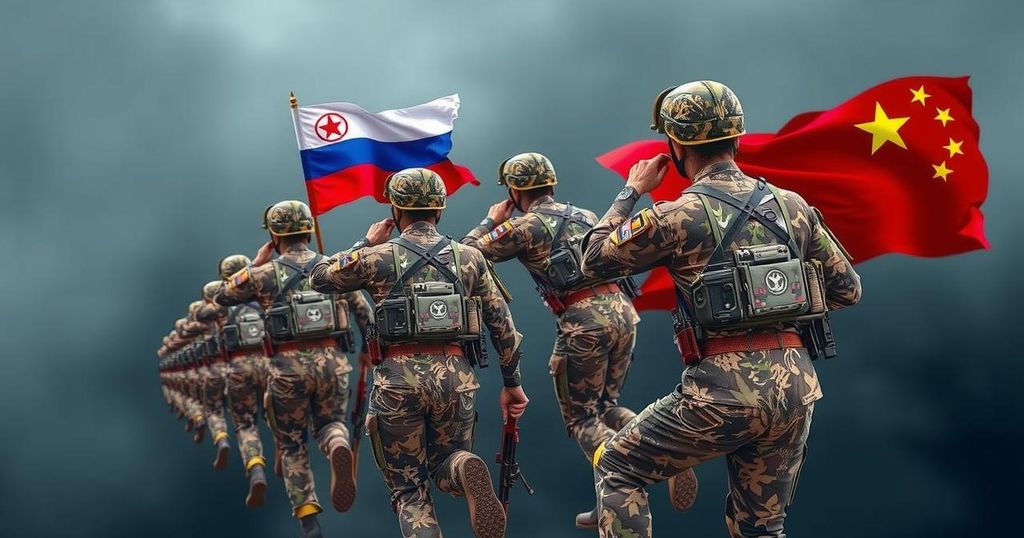The article examines how North Korea’s recent troop deployment to support Russia in the Ukraine conflict has transformed Chinese public perceptions, shifting from negative views to a newfound admiration for the nation. It highlights the historical context of North Korea’s relationship with China and suggests implications for future geopolitical dynamics in the region.
Recent developments have shifted public sentiment in China regarding North Korea, transforming the once derided nation into a symbol of admiration. This change is largely attributed to North Korea’s recent decision to deploy troops to support Russia in its ongoing conflict with Ukraine. Historically perceived as a ‘neighborhood hooligan’ with an erratic regime engaged in nuclear proliferation, North Korea’s actions have now garnered unexpected approval among the Chinese populace, illustrating a complex narrative of geopolitical alliances. During my 18-year tenure in mainland China, particularly in Beijing, I had multiple opportunities to visit North Korea, allowing me to witness firsthand the Chinese perspective on their neighbor. The prevailing attitudes, often uncomplimentary, reflected concerns surrounding the North Korean regime’s reliance on Chinese aid despite its persistent threats to regional stability. Such sentiments included comments like, “What a shameless neighborhood hooligan,” which encapsulated the frustration felt by many Chinese citizens towards North Korea’s provocative actions. Moreover, the impoverishment and distress experienced by North Koreans, while their leadership amassed wealth, contributed significantly to this negative portrayal. However, with North Korea’s recent military support for Russia, perspectives are evidently changing. This act has stirred feelings of national pride and admiration amongst some segments of the Chinese public, who now perceive North Korea as a steadfast ally in opposition to Western powers. This shift indicates not only a changing attitude toward North Korea but also reflects the broader implications of international relations and nationalism within China. The evolving perception serves as a reminder of the intricate dynamics present in East Asian geopolitics, particularly as nations adjust their narratives in response to global events. The transformation in Chinese public sentiment highlights the potential for altered political narratives based on external actions. As North Korea continues to position itself alongside Russia, it raises questions about the future of Sino-North Korean relations and the broader implications for regional stability. This emerging admiration may exacerbate tensions with the West while reinforcing an anti-Western sentiment that resonates with certain factions in China. In conclusion, the evolving narrative surrounding North Korea within the Chinese public illustrates the fluid nature of geopolitical perceptions. As North Korea gains acceptance for its support of Russia, it emphasizes the potential for shifting alliances that impact regional dynamics. The historical context of North Korea’s relationship with China will continue to play a crucial role in shaping perceptions as external factors influence internal narratives.
The article discusses the shifting attitude of the Chinese public toward North Korea, particularly in the context of North Korea’s recent decision to send troops to aid Russia amidst the Ukraine conflict. Historically, North Korea has been viewed negatively by many Chinese citizens, who perceive the regime as erratic and impoverished, often criticizing its reliance on Chinese support coupled with its provocative military actions. However, this viewpoint appears to be changing as some in China begin to admire North Korea’s military alignment with Russia, indicating a complex interplay of geopolitics and national pride.
The change in public sentiment in China regarding North Korea underscores the fluidity of international perceptions influenced by geopolitical events. This transformation from scorn to admiration illustrates not just a shifting relationship between China and North Korea, but also reflects broader themes of nationalism and regional dynamics, especially in light of the ongoing tensions with Western powers. As the situation evolves, it will be crucial to monitor how these sentiments influence China’s foreign policy and its relationship with its neighbor to the north.
Original Source: www.scmp.com






